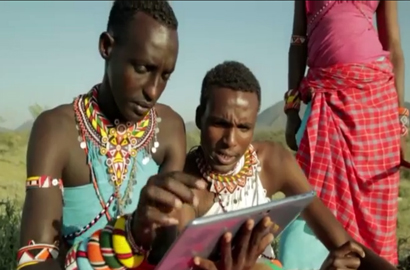The Microsoft-led 4Afrika TV white spaces internet access project is now delivering broadband access to over 6000 people in rural Kenya, for as little as a dollar a month.
The TV white spaces access project, run in Kenya in partnership with Indigo Telecommunications, was launched in February this year under Microsoft’s far-reaching 4Afrika development project.
The Kenyan pilot, Mawingu (meaning ‘cloud’) uses unused TV spectrum to deliver high speed broadband to rural communities at very low cost. This white space, the wireless spectrum being freed up as countries migrate from analogue to digital television signal, allows for internet access using mostly existing infrastructure, at low cost.
The Mawingu project is supported by the Kenyan government’s Ministry of Information and Communications. A similar TV white spaces project is set to roll out in Tanzania, in partnership with UhuruOne and the Tanzania Commission for Science and Technology. The initial project in Tanzania will target the University of Dar es Salaam, where tens of thousands of students and faculty members will be able to secure package including broadband and a Windows 8 device for a dollar a day. Microsoft notes that for every 8,000 students coming online, 12 jobs are created in the support centre servicing them too.
Around 11 other African countries showing great interest in using TV white spaces to deliver universal access, says Whitney Cubbison, Microsoft Africa’s Communications Director.
Using existing infrastructure and low cost base stations, Mawingu is now delivering high speed internet access to the people of rural Nanyuki and Kalema.
Its primary focus is on health care facilities and schools, but community hot spots are also available. Agents running the hot spots have 8Mbps connectivity. Over 6000 community members can now access the internet by signing up with local agents at only one US dollar a month. Because the base stations are solar powered, surplus solar power can also be bundled with the access package and sold through agents, giving users access to power to charge their devices, together internet access, from only USD1.50 a month for the entry-level package. Indigo Telecommunications aims to keep the top-level package priced below USD5 a month. Access devices are also being supplied to local schools through the project.
Locals using the new services say that previously, they would have had to travel great distances to access the internet, look for jobs, communicate with government offices or file reports. The new internet access is saving them both time and money, they say.
Samburu Chief Leparashau Resuk says the benefits of access are immediately apparent to him – he can, for example, now send messages to people far away, or easily sell a goat to someone further away, for more money. The first children to benefit have rapidly adopted ICT use.
Indigo Telecom Chairman Peter Henderson says using basic tools, the project has created something incredibly useful and potentially life-changing for thousands of people.
With only around 2% of Kenyans accessing broadband, mainly due to the cost of access, the Mawingu project is expected to have a major impact on communities. Henderson says while the project has started small, the fact that it is based on mainly existing infrastructure means it can be rolled out rapidly. He expects to reach up to 80% of the country within two years.
Henderson feels the Kenyan Government has shown immense foresight in supporting the project, and believes other governments across Africa should follow suit. Following the success of the first stage of the project, says Henderson, infrastructure is now being rolled out to cover the broader Nanyuki area, potentially impacting around 63,000 people.
“This is life-altering,” says Henderson. “When we first demonstrated the internet access tools at the local schools, at the end of each lesson, the kids would beg for more, saying: ‘we are wanting!’. If we can get a million kids a year connected, we will change their futures for the better. Through this project, we can create local entrepreneurs who will generate local income and employment.”
